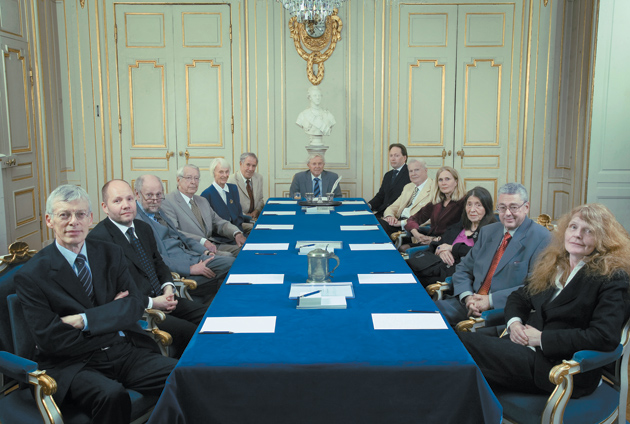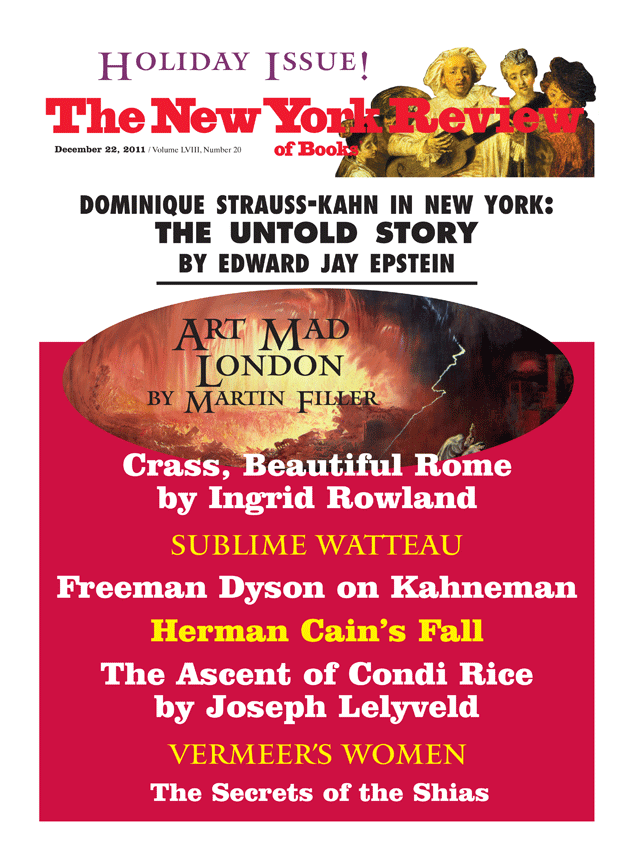In a letter to the editors, Per Wästberg, the president of the Swedish Academy’s Nobel Committee for Literature, has responded to a NYRblog post by Tim Parks about the Nobel Prize for Literature.*
The post was published on October 6, the day the committee announced that this year’s prize would go to Swedish poet Tomas Tranströmer. We publish here a text based on Parks’s blog post, Per Wästberg’s letter, and a rejoinder by Tim Parks.
—The Editors
So the Swedish poet Tomas Tranströmer has won the Nobel Prize for literature. Aside from a couple of long poems available on the Internet, I haven’t read Tranströmer, yet I feel sure this is a healthy decision in every way. Let me explain.
There are eighteen of them, members of an organization called the Swedish Academy, which back at the end of the nineteenth century was given the task of awarding the Nobel. At the time, two members suggested that it was a mistake to accept the job. The Academy’s founding brief, back in 1786, was to promote the “purity, strength, and sublimity of the Swedish language.” Was this compatible with choosing the finest oeuvre of “an idealistic tendency” from anywhere in the world?
All members are Swedish and most of them hold full-time professorial jobs in Swedish universities. On the present jury there are just five women and no woman has ever held the presidency. Only one member was born after 1960. This is partly because you cannot resign from the Academy. It’s a life sentence. For the past few years, however, two members have refused to cooperate with deliberations for the prize because of previous disagreements, one over the reaction, or lack of it, to the fatwa against Salman Rushdie and the other over awarding the prize to Elfriede Jelinek, whom he felt was “chaotic and pornographic.”
How do these people decide who are the greatest novelists and/or poets of the day on the international scene? They call on scores of literary experts in scores of countries and pay them to put down a few reflections about possible winners. Such experts are supposed to remain anonymous, but inevitably some have turned out to be acquaintances of those they have nominated.
Let’s try to imagine how much reading is involved. Assume that a hundred writers are nominated every year—it’s not unthinkable—of whom the jury members presumably try to read at least one book. But this is a prize that goes to the whole oeuvre of a writer, so let’s suppose that as they hone down the number of candidates they now read two books of those who remain, then three, then four. It’s not unlikely that each year they are faced with reading two hundred books. Of these, very few will be written in Swedish and only some will be available in Swedish translation; many will be in English; some reading will have to be done in French, German, or perhaps Spanish translations from more exotic originals.
Remember that we’re talking about poems as well as novels, many intensely engaged with cultures and literary traditions of which the members of the Swedish Academy understandably know little. Responding recently to criticism that in the last ten years seven prizes have gone to Europeans, Peter Englund, the president of the current jury, claimed that its members were well equipped for English but concerned about their strengths in such languages as Indonesian. Fair enough.
Let’s pause for a moment, here, and imagine our Swedish professors as they compare a poet from Indonesia, perhaps translated into English, with a novelist from Cameroon, perhaps available only in French, and another who writes in Afrikaans but is published in German, and then a towering celebrity like Philip Roth, whom they could of course read in English, but they might equally feel tempted, if only out of a sense of exhaustion, to look at in Swedish.
Do we envy them this task? Does it make much sense?
Now, let’s imagine that we have been condemned for life to making, year in year out, a burdensome decision to which the world increasingly and inexplicably ascribes a crazy importance. How do we go about it? We look for some simple and broadly acceptable criteria that will help us get this pain out of the way. And since, as Borges himself noted, aesthetics are difficult and require a special sensibility and long reflection, while political affiliations are easier and quickly grasped, we begin to identify those areas of the world that have grabbed public attention, perhaps because of political turmoil or abuses of human rights; we find those authors who have already won a huge level of respect and possibly major prizes in the literary communities of these countries and who are outspokenly committed on the right side of whatever political divide we’re talking about, and we select them. So we have the period when the prize went to Eastern bloc dissidents, or to South American writers against dictatorship, or South African writers against apartheid, or, most amazingly, to the anti-Berlusconi playwright Dario Fo, whose victory caused some bewilderment in Italy.
Advertisement
Sometimes the jury got their fingers burned. Having received so many major literary prizes in Germany and Austria, the left-wing feminist Jelinek seemed a safe choice. But her work is ferocious, often quite indigestible (she’d never win a literary prize in, say, Italy or England), and the novel Greed, in particular, which appeared shortly before the prize was awarded, was truly unreadable. I know because I tried, and tried again. Had the members of the jury really read it? You have to wonder.
What a relief then from time to time to say the hell with it and give it to a Swede, in this case the octogenarian acknowledged as his nation’s finest living poet and a man whose whole oeuvre, as Peter Englund charmingly remarks, could fit into a single slim paperback. A winner whom the whole jury can read in the original pure Swedish in just a few hours.
But most healthy of all, a decision like this, which we all understand would never have been taken by, say, an American jury, or a Nigerian jury, or perhaps above all a Norwegian jury, reminds us of the essential silliness of the prize and our own foolishness at taking it seriously. Eighteen (or sixteen) Swedish nationals will have a certain credibility when weighing up works of Swedish literature, but what group could ever really get its mind around the infinitely varied work of scores of different traditions. And why should we ask them to do that?
Here is Per Wästberg’s response:
May I, as a reader for decades of your journal, give a more factual background to Tim Parks’s article. This year’s laureate, Tomas Tranströmer, has been proposed, for years, by former laureates Joseph Brodsky, Seamus Heaney, and Derek Walcott. In New York in 2000, Susan Sontag told me that Tranströmer was the Swede most well-known in the US. He is translated into sixty languages; there are cafés named after him in China and Slovenia. And in Sweden we have all read and loved him since we were young.
The Nobel Committee consists of five members out of the rest of the Swedish Academy. By February we get about 220 suggestions from all around the world. By April we have concocted an “expectancy” list of twenty. By May we get the Academy to approve a short list of five to be read during the next four months. No one could get the prize without having been on the list for at least two years. Be sure we read a select group of American, Canadian, and Australian writers continuously!
We have, of course, Mr. Parks, read even Jelinek’s Greed, though it was hard going. And so much else! For my part I try to read one book a day to keep ill health away. We master thirteen languages in the Academy but when we suspect a genius hidden in an unknown language we call on translators and oath-sworn experts to give us generous samples of that writer.
We go for an individual’s life’s work regardless of nation, gender, or religion. We could, if need be, give it to Portugal or the US five times in a row, or to essayists, historians, or children’s book writers. We do not have a human rights criterion. We award, for example, Orhan Pamuk for his outstanding novels and essays; then the award becomes politically interpreted.
In the committee we are obsessed readers since childhood and so have a rich background to judge from. None of us has a university job; we are all free writers with our own manuscripts to take care of in between.
Per Wästberg
President
The Nobel Committee for Literature
The Swedish Academy
Stockholm, Sweden
Tim Parks replies:
One can only thank Per Wästberg for this generous clarification on so many fronts. That said, the object of my wonder in writing this piece was not so much the Swedish jurors, who have all my sympathy, tied as they are to such an onerous task, and even less so Tomas Tranströmer, who perhaps would have received the prize years before were it not for the inconvenience of his being Swedish too. No, what I find quite marvelous is the exaggerated attention and prestige the world affords to an annual ritual that can never be more than a valiant attempt to point the spotlight at one fine writer and thank him or her for giving us so much pleasure; this at the risk, however, of suggesting an unbridgeable gulf between that winner and the many others inevitably cast into the shadow: they include Jorge Luis Borges and Thomas Bernhard.
Advertisement
-
*
For the full text see “What’s Wrong With the Nobel Prize in Literature,” NYRblog, October 6, 2011, at nybooks.test/u/b. ↩



